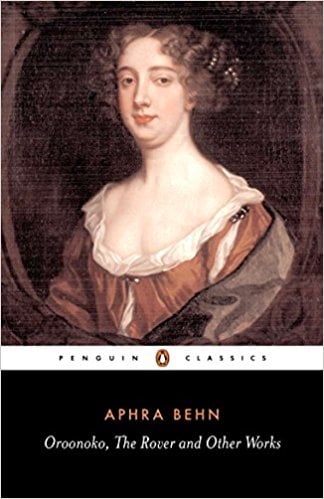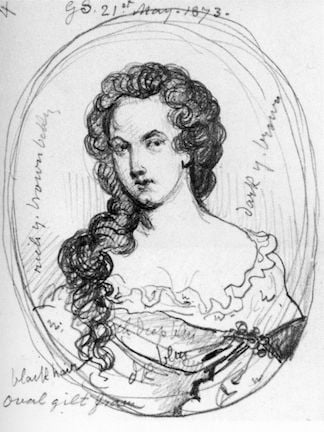Aphra Behn, English Playwright & Author of Oroonoko
By Nava Atlas | On April 26, 2018 | Updated March 25, 2024 | Comments (0)

Aphra Behn (December 14, 1640 –April 16, 1689) was a playwright, poet, and novelist known for being the first British woman to earn her living by her writing.
Born in Wye, Kent, England, as a child she was taken to Suriname (presumably by her parents), which at the time was an English possession.
While there, Aphra discovered the legend of the African prince Oroonoko and his beloved Imoinda. This later inspired what became her best-known novel, Oroonoko. She also has the distinction of being the first British woman to earn her living by her writing.
A return to England from Suriname
Aphra returned to England some time between 1658 and 1664, having come of age. Shortly after her supposed return to England from Suriname, Behn may have married Johan (also written as Johann or John) Behn. Very little is known about him, other than that he was German or Dutch and possibly a merchant.
The marriage was brief, though it’s unknown whether it was due to widowhood or separation, but Aphra continued to use “Mrs Behn” as her professional name.
Aphra’s wit and charm somehow brought her into the court of Charles II, and the king sent her on secret service as a political spy in Antwerp during the second Anglo-Dutch war. She used the code name Astrea, which she later used as a nom de plume for some of her writings.
Though she successfully accomplished the objects of her mission, legend had it that she was never paid for her spy services. Returning to England penniless, it’s often reported that she went to debtors’ prison, though this part of the story may or may not be true.
A prolific dramatist
Her history came into sharper focus and was verifiable by fact when she started her career as a writer. She’d had her fill of politics (though she continued to criticized the whigs).From the 1670s to the 1680s, she was one of the most prolific playwrights in Britain.
It was from this time onward that she supported herself by her writings. Among her plays wereThe Forced Marriage, or the Jealous Bridegroom (1671); The Amorous Prince (1671); The Town Fop (1677); and The Rover, or the Banished Cavalier (in two parts, 1677 and 1681), The Debauchee (1677), The Counterfeit Bridegroom (1677), and The Roundheads (1682).
The Rover (1677) was arguably her most successful play, and remains one of her best known. King Charles II’s mistress, Nell Gwyn was a famous actress who came out of retirement to play the role of the whore, Angelica Bianca.
Behn was severely criticized by some for writing in a “coarse” or “masculine” style, which is to say that she included themes of sexual desire in her works. Occasionally, she wrote of love between women, leading some to later call her the “English Sappho.”
Her work was considered risqué, even shocking and scandalous. On the other hand, she had many supporters and admirers of her work, including esteemed male authors of her time.
Aphra was immensely prolific, creating and staging nineteen plays, contributed to others, and became the first renowned female dramatist in Britain. Her dramas showed a thorough comprehension of stagecraft, and her wit always shone through.
One of Aphra’s last plays, Like Father, Like Son (1682) was such a flop that it wasn’t preserved in print, as were many of her other plays. The merging of the theatre companies for which she wrote made the writing of plays less profitable for her, and though she wrote a small number of plays after this one, she focused more on other forms of writing.
. . . . . . . . . .

The Scandalous, Sexually Explicit Writings of Aphra Behn
. . . . . . . . . .
Mastery of poetry and prose
Though Aphra became renowned for her dramatic work, in her heart, she wished to be remembered as a poet. Like her plays, her poetry spoke of love, longing, and sexual themes.
One of her best known poems is “The Disappointment” — a description of a sexual encounter from a woman’s perspective. The “disappointment” in the poem has often been interpreted as male impotence.
Aphra’s first collection of poetry, Poems Upon Several Occasions, was published in 1684. That same year, Love Letters Between a Nobleman and His Sister was published, becoming an early example of the epistolary novel, that is, one told entirely in letters. These two 1864 books were quite successful, quickly going through several printings.
Love Letters was spun into two sequels: Love Letters Between a Nobleman and His Sister, Second Part (1685), and The Amours of Philander and Silvia (1687).
Oroonoko
In 1688 Oroonoko was published. The story of a noble slave and his tragic love, as mentioned earlier, may have been based on legends Aphra heard during her youth in Surinam. Notably, it was the first English novel to express empathy for slaves.
Like the works that came just before it, Oroonoko was quite successful, and was adapted for the stage in 1695 (though the author by then had been dead for several years). It continues to be her best known work. Francis Booth, author of Killing the Angel: Early British Transgressive Women Writers, observes:
“Her late novel Oroonoko (1688) is critical of both colonialism and slavery and is sympathetic towards its eponymous, noble African hero. It is set in the recently founded Dutch colony of Surinam, whose economy depended totally on slavery and which Behn herself had visited; she became a staunch opponent of slavery herself.”
. . . . . . . . . .
Aphra Behn and the Beginnings of a Female Narrative Voice
. . . . . . . . . .
The later years and legacy of Aphra Behn
Despite the success of her novels and poetry, Aphra Behn’s last years brought her ill health and debt. She had difficulty using her hands, but continued to write until the end, and was a celebrated literary figure.
She died on April 1689 at 48 years of age, and is buried in the East Cloister of Westminster Abbey. The inscription on her tombstone reads: “Here lies a Proof that Wit can never be Defence enough against Mortality.” She was quoted as stating that she had led a “life dedicated to pleasure and poetry.”
She is considered a highly influential dramatist of the Restoration era, and her prose work has been important to the development of English fiction that came after. She also did a substantial amount of work as a translator, mostly into French.
Aphra Behn not only broke new ground as a woman author who lived by her pen and didn’t limit the scope of her subject matter. She became a literary role model for many generations of women authors who came after her, and as such, inspired these lines by Virginia Woolf:
All women together ought to let flowers fall upon
the tomb of Aphra Behn, … for it was she who earned
them the right to speak their minds.
Vita Sackville West’s homage to Aphra Behn
In 1927, Vita Sackville-West published a slender volume honoring her countrywoman titled Aphra Behn: The Incomparable Astraea. Here is a portion:
Aphra Behn, that good-humoured lady, that lady ‘dressed in the loose robe de chambre, with her neck and breasts bare; how much fire in her eye! What a passionate expression in her motions! How much assurance in her features!’ . . . From the moment when she was carried, an infant in arms, past the hop gardens and into the church under the green hill at Wye, she set out on a career rich in contradiction and controversy. . .
She was an inhabitant of Grub Street with the best of them; she claimed equal rights with men; she was a phenomenon never before seen, and, when seen, furiously resented. The anger of her critics and rivals was equalled only by her own anger at not being dispassionately judged.
Well aware of her own position as a pioneer, and confident in her own powers to carry through the task she had undertaken, her tongue and her pen grew tart under the injustice of organised attacks. ‘A woeful play, God damn him, for it was a woman’s’. . .
But although sometimes angry, and often hurt, she was never discouraged. Novels, translations, poems, plays streamed from her quill, together with vituperations and retaliations fired at her detractors. From the moment that she took to writing, to the day of her death, she was never worsted; by her stubbornness she rendered a service to her sex, and it was no small service. . . .
She might be abused, there might be a clique determined to destroy her, but at least she was recognised, at least she had a name that came frequently up for discussion in the coffee-houses and the drawing-rooms. She was attacked, but she was not ignored.
More about Aphra Behn
On this site
- Aphra Behn and the Beginnings of a Female Narrative Voice
- The Scandalous, Sexually Explicit Writings of Aphra Behn
- “The Disappointment” (full text of 1680 poem)
Major Works
Aphra Behn’s output was immense. This is a small selection of some of her best-known and preserved works.
- The Forc’d Marriage (1670)
- The Amorous Prince (1671)
- The Dutch Lover (1673)
- The Town Fop (1676)
- The Rover, Part 1 (1677) and Part 2 (1681)
- Sir Patient Fancy (1678)
- The Feigned Courtesans (1679)
- The Roundheads (1681)
- The City Heiress (1682)
- Like Father, Like Son (1682)
- The Emperor of the Moon (1687)
Novels
- The Fair Jilt
- Love-Letters Between a Nobleman and His Sister
- Oroonoko
Poetry collections
- Poems upon Several Occasions, with A Voyage to the Island of Love (1684)
- Lycidus; or, The Lover in Fashion (1688)
More information
- Wikipedia
- Poetry Foundation
- Behn on Writers Inspire
- Reader discussion on Goodreads
- Aphra Behn in fiction: Het Vuur Van de Vreemeling by Mirjam Molenaar (Dutch)
Biographies
- Aphra Behn: A Secret Life by Janet Todd (2017)
- Aphra Behn: The English Sappho by George Woodcock (1996)
Read and listen online

Leave a Reply